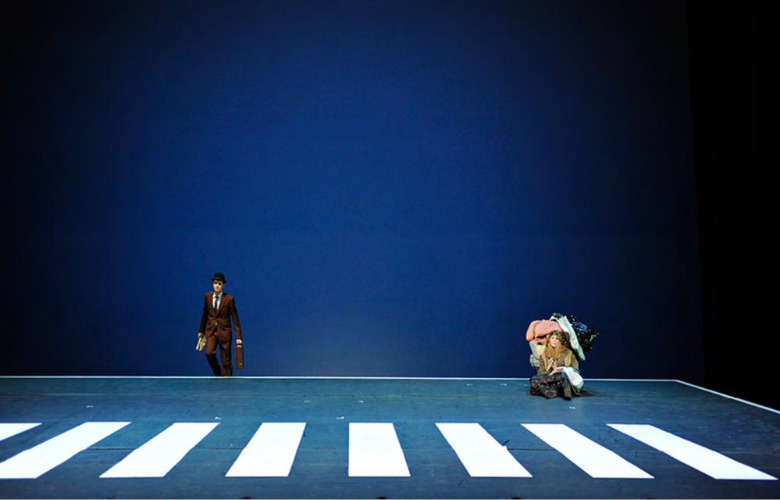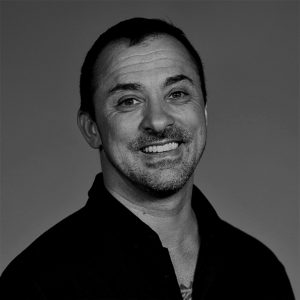
Jan Freese is a charismatic, successful (and I dare say brilliant) set designer from Berlin, Germany. Over the years, he has worked internationally for theater and opera with directors in Berlin, Vienna, Zurich, and Paris.
In between designing and rehearsals, we were lucky to catch Jan for an interview to ask him these questions:
That was pure coincidence. Back then, I studied art history and archeology. However, I realized quickly that a career in science is not for me.
All that remained with my background was – to make art.
Painting and sculpting – too lonely!
Music – no talent!
Architecture – dyscalculia!
All that remained then was theater. And the wonderful thing about this is: theater combines all the elements mentioned above.
When I started at the Gorki Theater in Berlin, I had no idea about this profession. It was simply a great experience and that’s the only reason why I continued.
Well, to get a foot in the door was comparably easy, even without a degree from an art academy. I interned for a while, then assisted, and then my first own work resulted automatically.
Interesting is not the door, however, but the empty white rooms which lay beyond. They want to be filled with life.
My profession means first and foremost collaboration and working in teams. To be successful is easy. To produce continuous high quality is much harder.
Without a network of people with whom you can fruitfully work together, continuity is impossible.
The search for these ‘partners in crime’, directors, costume designers, actors, actresses, singers never stops and is, for me, the crucial component. The ability to build this structure for yourself requires much beyond artistic talents. It takes energy, perseverance, concentration, and patience.
For a long time, my work in theater was bound to the German language.
But, when I became more involved in opera, operetta, musical, and dance productions, the teams I worked with became more international as well since the language of music is far more universal.
Nowadays, I don’t want to miss the exchange between artists from different cultures anymore. Artists, who meet on a rehearsal stage for a production to work together.
The murmuring of many languages backstage is something fabulous.
For a few years now, I’ve been working as a member of staff in director Barrie Kosky’s stage team. His main set designer is Rufus Didwiszus. We realize productions across Europe together and it is great fun to work in this constellation. It also contributed significantly to a internationalization of the productions I am involved in.
Theater is a temporary art. It is volatile. As such, all that remains are memories. Not much else. Maybe a few photos in archive boxes.
But of course, all projects from the last 25 years stay with me, feed the present, and thus build future work.
My first opera was definitely special. It was Don Giovanni in Berlin, directed by Katharina Thalbach. Back then, it was also her first opera. At the opening we heard many “Boo”s and “Bravo”s at the same time. It was an enormous racket. This was both thrilling and beautiful.
On September 11, 2001 we rehearsed a comedy about Irish terrorists at the Deutsche Theater. The events in New York made working almost impossible that day. Very funny in retrospective, but not funny at all at the time.
Basically, the most beautiful productions are those who challenge you in a special way or during which you end up being in a state of permanent growth and learning.
Due to opera director Yona Kim and costume designer Falk Bauer, I was granted a glimpse into the world of Baroque opera. Working with them taught me about all the scenic possibilities that come with this kind of music.
Same thanks goes to choreographer Otto Pichler for unveiling the world of operetta for me.
While working with actors and actresses, I learned the most from Katja Wolff during our rehearsals for comedies. The mechanics, the timing, the perfect punch line.
These are all things I remember very strongly. Experiences that accompany me throughout my career.
Outside of state-supported cultural institutions it was surely an Othello production in the JVA Wiesbaden with director Arne Dechow and a group of prison inmates that has, to this day, left a strong, lingering impression on me.
At the moment, I am working for theater again. We are staging a production for the State Theater Augsburg with director Sebastian Schug. Sebastian has a very unique way of interacting with performers in order to give them the greatest possible amount of freedom.
It is full of relish, imaginative, pressure-free, whilst at the same time being extremely precise, elegant, and sensual. This is fascinating and makes a special event out of every rehearsal.
The languages are different – the situation ‘stage’ is the same. A human being in a beam of light is magical in the same way, the world over.
Structurally speaking, we work here in Germany, Switzerland, and Austria with a theater system that is, compared to other countries, like a paradise.
The theater density is huge, a lot is being produced, and it is not private money which you are spending.
This makes the biggest difference in comparison to other countries and influences the way we work, as well as the quality of our work.
Ultimately, the spaces belong to the performers. That’s why they are built. No more and no less.
At first, it was a harsh cut, with many cancellations and postponements.
Since then, this has revitalized itself and, even more productions resulted from it all. Contracts which, without Corona, would not have happened in this way, as loss compensation so to speak.
For this, I am immensely thankful to some Houses and I will remember it.
Of course, there are also the Houses who were completely overwhelmed and left their independent artists and teams standing in the rain. This, as well, is something that will surely be remembered.
But, for the moment, I am glad to be allowed to rehearse again. And, if all goes well, there will be a premiere in September.
To be more specific about the current project: we were forced to design the set in accordance with the new hygienic and distancing rules.
Considered in retrospect, these changes have done our concept a world of good. The enforced changes have even helped to portray the characters from the wonderful text by Bernhard Studler much stronger than we initially thought.
The crisis as opportunity.
We were lucky that this works with our story, since the topic of isolation is an integral part of “Night without Stars.” An internal isolation which is now mirrored on stage as well by a spatial one.
Sebastian is well known for his physical productions. This is why, in the beginning, we had a tough time thinking about a “don’t touch” situation.
But, lo and behold: interesting imagery and strong situations developed through these limitations on stage.
Art is forced to react to these hygiene and distancing requirements and she will solve this task very creatively in a diverse manner.
I am definitely part of the optimist faction, despite all difficult phases.
But, I also believe we will have to deal with more difficult working conditions in the future.
The arts budget of many states and cities will not rise for the time being, rather the opposite. This has a direct effect on salaries, production budgets, etc.
For independent actors, actresses, and singers it might become more difficult to give a guest performance.
All things considered, more work will be necessary for less financial reward.
However, in the middle of the lockdown, my son passed his entrance examination for the Art Academy in Leipzig.
At the time, I took this as an enormously hopeful sign.
Life goes on, no matter if system-relevant or not.
Don’t Wear That Hat: Theatre Superstitions & their Origins
The Importance of Kindness in Entertainment


Liam Klenk was born in Central Europe and has since lived on four continents. Liam has always been engaged in creative pursuits, ranging from photography and graphic design, to writing short stories and poetry, to working in theatre and shows. In 2016, Liam published his first book and memoir, 'Paralian'.
Read Full Profile© 2021 TheatreArtLife. All rights reserved.

Thank you so much for reading, but you have now reached your free article limit for this month.
Our contributors are currently writing more articles for you to enjoy.
To keep reading, all you have to do is become a subscriber and then you can read unlimited articles anytime.
Your investment will help us continue to ignite connections across the globe in live entertainment and build this community for industry professionals.